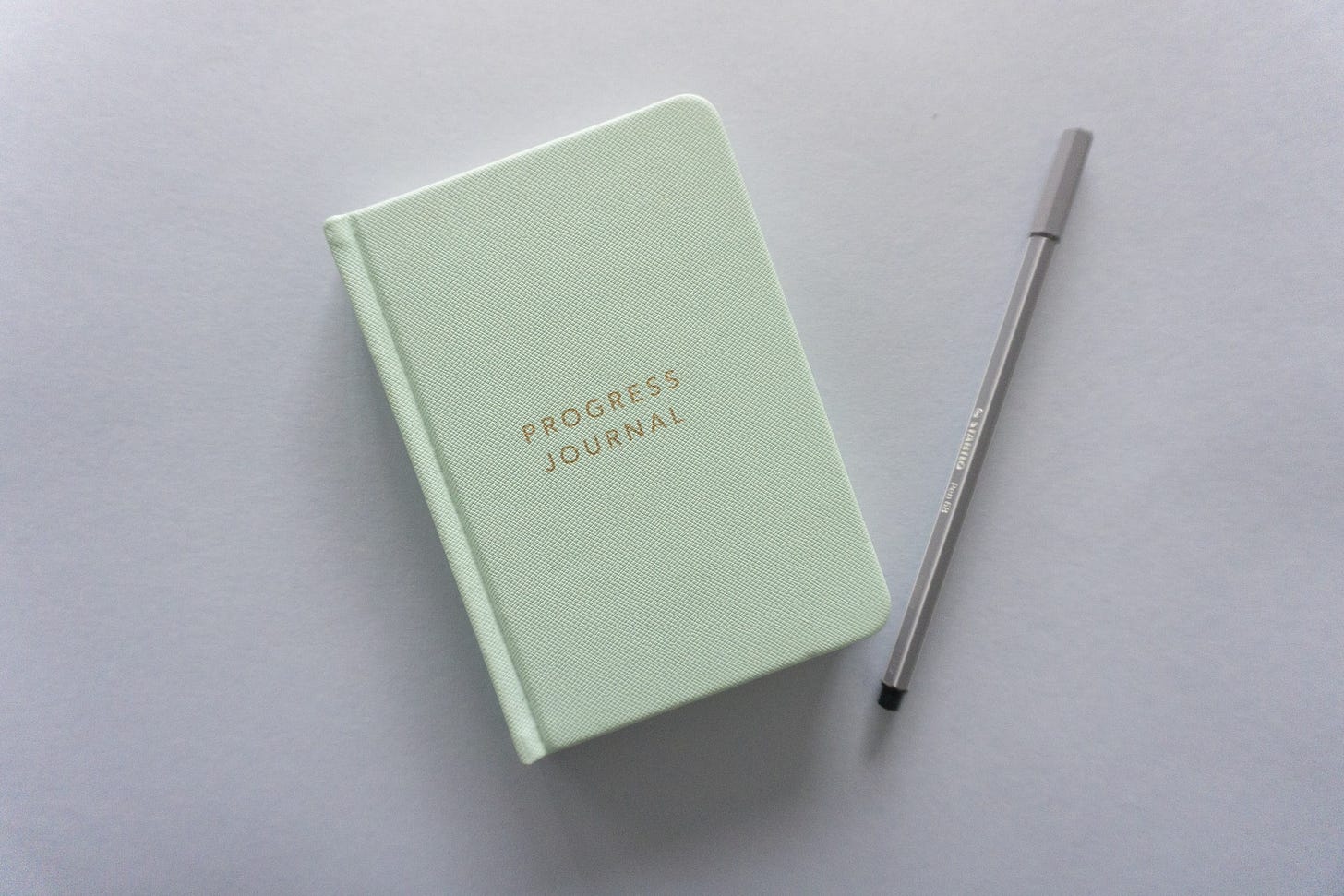Don't Stress It! - Lesson 1
Understanding the enemy, good stress vs. bad stress explained, and a small, fun challenge for you.
Welcome to The Feel Good Life! A newsletter about health, prevention, empathy, and hope. I’m Dr. Mariana and you have just arrived to the first lesson of my course on managing stress.
Welcome to Lesson 1 of this stress-buster course!
In case you missed it, here’s the Intro to our course. And today, we will dive right into our first lesson.
In this lesson you’ll learn:
An introduction: Understanding The Pattern
Good Stress vs. Bad Stress Explained
Challenge #1: The 1-Hour Morning Journal
And to get us started...
Understanding The Pattern
Here’s a story that’s all too familiar.
This lady rocks.
She’s someone you know and admire. You wish you had her energy, her ability to hustle. Everyone admires how she gets so much done every day. She works part-time in a demanding role - which she’s great at - and then she goes home and works on a pet project that she loves, something she’s been building for years (and everyone knows it’s going to really take off at some point). She has an active social life, a happy home life, and everyone wants to hang out with her. She's truly awesome.
That’s one view - but here’s her perspective.
She doesn’t sleep. The same thoughts keep whirling round her head, the same worries making her sweat. The headaches are getting worse, and she’s also getting strange aches and pains in the weirdest of places. She can’t seem to shake off that flu - and it’s making her really irritable. Last week she yelled at someone at work over the stupidest thing, which she felt so, so terrible about - but then she did the same with her husband a few days later.
It’s not any one thing that’s stressing her out. It’s everything, all at once, and she’s not coping. She’s hanging in there, but only just - and that's frustrating, because she could easily handle this kind of pressure in the past. Well, no matter. She ploughs onwards. Coffee helps. So do those glasses of wine at the end of the day, although her dreams have been...disturbing of late. She used to be more hopeful than this, more positive about her plans and more capable of enjoying the moment - but now everything is in shades of grey, and that’s really upsetting her.
From the outside it looks like she’s ok (better than ok), but deep down, her body’s telling her otherwise...
And it’s getting worse every week.
Let’s skip forward a year or two.
Now she’s taking painkillers and sleeping pills. She’s self-medicating away some of the symptoms - but the pills aren’t tackling the causes.
Unsurprisingly, she’s not getting better.
Head-colds now last for weeks. Strange aches have become permanent burdens of pain. Her menstrual cycle is erratic, and she has no idea why her weight has changed when her diet is roughly the same as it always was. A good night’s sleep feels like a myth - and she’s had a few times where anxiety overwhelmed her at work, causing all sorts of problems. Everyone knows she’s struggling, including her boss, because she’s capable of doing less and less, and the quality of her work is really suffering. Her moods swing all over the place - she’s over-sensitive where she needs to be tough, distracted where she needs to focus, and distant where she needs to care.
Everything in her life is in turmoil.
Now she’s taking sick days from work, and puts all her plans on hold. It’s terrible timing, she’s so behind with everything, but she can’t keep going like this. Her ability to work is completely shot. Now, at long last, she goes to the doctor - and she tells him everything. The doc listens carefully, checks her out, runs all kinds of tests, and asks her to come back in a few days. She spends those days in a fog of distracted dread.
Finally, the fateful day.
“What’s wrong with me?!”
“You’re suffering from complications arising from chronic stress. Your blood pressure is dangerously...”
“What? Stress? That’s a medical thing? How can stress cause all this?”
“Very easily, I’m afraid, and now…”
“Hey, come on. Stress is just a normal part of modern life. It’s nothing! I mean, it’s not serious, right? I can just take some pills, take a holiday and everything will be fine?”
The doctor quietly says: “Two years ago? Yes, that would have been true. But I’m afraid it’s not that simple anymore.”
What now?
We'll learn that just ahead.
Stress is the most 'normal' threat our health will ever face.
We all grapple with stress. When was the last time you felt so calmed, relaxed and happy that you had 24 hours entirely free of all your worries? Exactly. And that’s entirely normal. Modern life is never uneventful - but it also it doesn’t have to be the rollercoaster of fear and suffering that longterm stress creates for you.
Stress is a silent killer.
We never think it’s getting to us.
Sometimes, we don’t even see it.
It’s easy to spot it when, say, you’re crossing the street without paying enough attention, and you’re almost hit by a car. Thumping heart, trembling muscles, gallons of perspiration? Stress, of course - because, duh.
But what about that tiredness you can’t shake off, the one that sends you to sleep in front of the TV every evening when you get in from work? What about those weird flashes of anger, those moments of uncontrollable irritation at family members? What about uncontrollable chocolate cravings?
We know stress can be detrimental to our health, but most of us think we’re protected, safe from its effects. In fact, we all suffer from it. All of us, without exception. It fills every empty corner of our lives. We think we know what it is, but if we really did, we’d be fighting it every day - even though it's a fight we'll never truly win.
Stress can’t be beaten. But don't worry. We’re not trying to eradicate it - we’re trying to control it.
This course won’t teach you how to completely banish stress from your life forever, for two reasons:
That’s unteachable. Stress will never completely go away….
...and if it did, you’d be a lot worse off.
Eustress - Good Stress vs. Bad Stress Explained
A certain amount of stress - the right kind of stress - keeps you safe. It also sharpens your mind, helps you work (and play) really hard, and meet all the demands of your busy life.
First, safety. The emergency systems of our body rely on the healthy kind of stress. We’ll go into details later, but for now, here’s a quick overview: When there’s an immediate threat to our well-being, our brain notices and sends a message to the rest of our body to activate its defences, better known as the “fight or flight” response. We become abnormally aware of our surroundings, our eyes go wide, and our heart starts racing, pumping oxygen towards critical muscles in readiness for action. Our brain, pancreas, liver and all the other organs are now ready for the worst - and when it doesn’t happen, the brain tells the body to stand down. We take a deep, shaky breath - and relax.
This is how we’ve successfully dealt with life-threatening crises for millions of years, by supercharging our body’s ability to deal with trouble in a handful of heartbeats. It’s a marvel. It’s served us well (after all, millions of years later, here we are).
It’s useful.
Then there’s the kind of stress that comes with ambition in action, when we strive for something, working towards a goal we really believe in. This is eustress - often (somewhat unhelpfully) shortened to just “stress”. You know that exciting buzz you get from doing something you’re proud of, or that feeling of being ‘in the zone’? That’s eustress. When it's managed, when you're calling the shots, it’s your friend. When not managed, it becomes distress.
From an early age, we need a certain amount of both these kinds of stress to become resilient. But when stress becomes a recurring feature of your life, ugly things start to happen. When your natural defences are being triggered by the wrong things, in the wrong way, and kept at Red Alert status way longer than they should, they severely disrupt your body’s ability to deal with threats. They burn out.
You sicken.
You weaken.
Your health is compromised.
The best time to tackle stress is before those defences get fried, before you get ill. We’re not going to treat the problem when it has already happened - we’re going to prevent it from happening at all.
We’re going to learn how to fence stress in, put it on a leash, and take away its power to damage your long-term health.
And believe me, your body is going to thank you for it.
Right now, it isn't. In fact, it might be giving you the wrong signals entirely.
As you’ve seen, the bad kind of stress has a tendency to linger and get worse - and at first, this happens slowly. This is the most dangerous time of all, because your body’s growing used to it. Stress becomes a threat you can’t find, because you don’t even know it’s there anymore.
As you saw at the beginning of this newsletter, it can grow for years. A decade might pass filled with low-grade suffering, but nothing dramatically awful happening. Kids may grow up, jobs may evolve, and we explain away all the headaches and pains and disturbed sleep as a sign that we’re not as young as we used to be. In short: we grow accustomed to feeling bad.
I’ve seen this again and again in my patients. They don’t even know they’re supposed to feel better than they currently do. It hadn’t even occurred to them.
Did life get in the way of their wellbeing? No. Life isn’t about feeling miserable and in pain, whatever age you’re at. The human body’s ability to heal and strengthen itself is astonishing. Yes, you can still be physically active in your later years - just ask Charles Eugster, or this 100-year-old runner.
But it’s not about superhuman feats - it’s about relief from entirely avoidable suffering, so you can feel as well as you should feel, now and in years to come.
So no - life didn’t get in the way. Stress got in the way.
Nobody needs to be sitting in a doctor’s office, scared out of their minds as they realise the damage has been done and there’s no going back. Ideally, it would never happen - and it doesn’t need to happen. It’s avoidable.
That’s why I made this course, to manage stress on two fronts:
To learn exactly how to control it, and
To learn how to stick to healthy habits, including the ones that tackle stress.
The good news is, you don’t need to make massive, seismic changes in your lifestyle (which is a good job, because let’s face it, those things never work in the long run).
We’re focusing on small, meaningful changes that you’ll be able to stick to - and I’m going to teach you how to stick to them, so every day, managing stress is a complete no-brainer, requiring zero willpower. You’ll feel the results almost immediately - and you’ll enjoy the results for the rest of your life.
And in our next lesson, we’re going to start learning exactly how habits work.
But first - I want you to do the following challenge. It's important. It's a key part of the course. We'll be using it next time (and I'll be asking questions). Ready?
1, 2, 3, Challenge...Go!
Challenge: The 1-Hour Morning Journal
From the moment you open your eyes to the sixtieth minute later - what exactly did you do yesterday morning? What was the order of things? I bet you're finding it hard to remember. That's ok. Everyone finds it hard to remember.
Well, from now on, you don't have to remember. You just have to write it down.
Document the first hour of your day.
An hour after you wake, take five minutes to list everything you've done in this hour.
(Keep it simple, but be specific. Don't write "visited bathroom" - write "showered" and "flossed" and "brushed teeth".) Do that for the next few days. No need to do anything out of them, just observe, write it all down and keep those notes. We'll need them next time. :)
Have fun!
One last note before I go:
I want to take a special moment here to express a heartfelt gratitude to
from Everything Is Amazing.A few years ago, when I wanted to create this course, Mike was deeply encouraging and supportive of my big, crazy ideas. He kindly helped me by giving a beautiful shape to this course after I wrote it all down. After all these years, this course is still amazing, alive, useful and successful thanks to this joint work. I can’t thank him enough for his presence and his inspiring willingness to always help others thrive.
If you ever want to get yourself a kind, smart word magician who can help you join all the dots in your head, and land your piece in the most beautiful, unimagined ways, please, go to Mike.
Okey then! That’s it for today. :)
See you in Lesson #2!
All the best,
Dr. Mariana
Image Credits: Pixabay, Unsplash












This is so helpful. Thank you ❣️🌹
I so could have done with a course like this a good few years ago when our family was going through a huge crisis. We struggled and sought help specifically for ‘how to deal with the stress’, ending up being given marriage counselling despite being one of the strongest couples around. Cos having a picnic on the carpet in the living room as a couple was going to solve the stress of my child trying consistently trying to unalive themselves. I can still remember how awful I felt from the stress, and how disappointed I was with it being insinuated my marriage was the issue. I’m sure I still suffer, the child, death of family, etc. and would really love to feel less wound up all the time. (Even if it is so much less now than it was back then.)